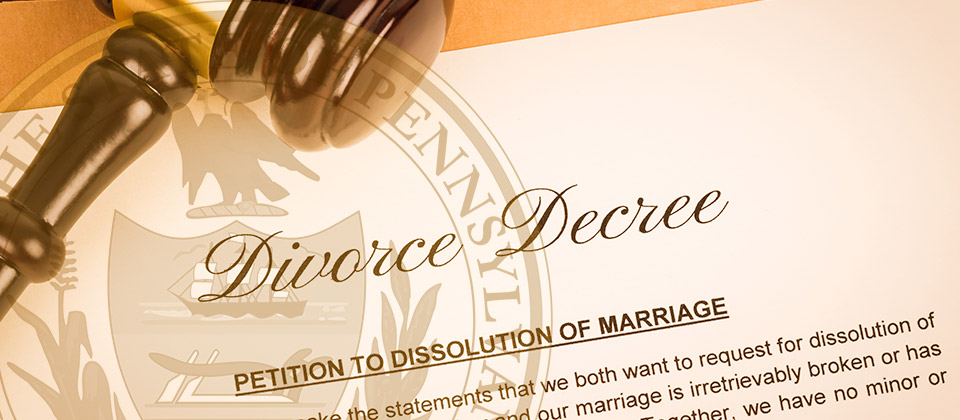Guide to Pennsylvania Divorce Records

Every state and county has a slightly different method for handling vital record requests, and Pennsylvania is no different. There are differences in fees, processing times, and required forms you will need to contend with when getting Pennsylvania divorce records.
Using the same process in Pennsylvania as you would in Texas will lead to a returned application and wasted time. This is often a major setback for anyone working through stressful life events requiring the information in their divorce records.
What are Pennsylvania Divorce Records?
In Pennsylvania, divorce records are a collection of all the documents and transcripts used in the divorce proceedings. These records have two primary purposes.
Their first job is to act as proof that a marriage has ended for clerical reasons. Many governmental and legal processes require divorce records to prevent people from unlawfully entering second marriages or making permanent changes to their records.
The second purpose of these records is to establish context for the decisions made in court. One party may want to amend the final judgment due to changing life circumstances. They must prove that there's been a considerable change in their situation compared to the time of divorce.
The divorce record gives a clear picture of each spouse's financial and mental state leading into the divorce and will help significantly in decisions surrounding amendments to the final judgment.
Pennsylvania is somewhat unique when it comes to storing divorce records. The State Vital Records Office does not maintain any divorce records. Only the county courts that finalized the divorce have access to the information.

What's Inside the Divorce Record?
The contents of a divorce record are dictated by what happens in court. High-profile divorces will focus on the distribution of assets, while fault-based divorces may seek to deny custody and visitation from one spouse.
However, regardless of the main focus, nearly all records will include the following aspects:
- Final Judgment - The judge signs this document, signifying the end of the marriage. Both parties are legally considered single, marking the beginning of any new agreements outlined in other parts of the divorce record.
- Affidavit - Family Courts require both spouses to report their financial status and assets. The information includes financial accounts, life insurance policies, tax particulars, and any outstanding debts.
- Spousal Support – This section outlines how much one spouse pays the other on a scheduled basis. It's meant to cushion the financial transition that a lower-earning spouse experiences after a divorce. Alimony is only meant to last until the other party becomes self-sufficient in Pennsylvania.
- Child Custody - These documents clearly state each parent's rights and responsibilities toward shared children. Details include where the children will live and how much financial support the primary caretaker requires.
- Division of Assets and Debt - Pennsylvania Family Courts only divides assets gained while married. Property and debt owned before the wedding are kept by the original holders unless those assets changed in value while the marriage is active.
Errors in Divorce Records
Existing errors in your divorce records pose numerous legal and financial risks. The documents in your divorce records inform the judge's decision. So, if the judge looks at incorrect numbers, it will affect long-term decisions around spousal support and child custody.
The difficulty in addressing errors in divorce records depends on the ex-spouses' relationship and the implications of rectifying it. The other party will likely fight against any corrections that go against their interests, and you may find yourself returning to court.
Individuals should diligently review divorce records throughout the proceedings to mitigate these risks. . Pennsylvania Code 903 allows 30 days after the divorce to appeal. This is the best time to discuss potential errors.
Divorce Statistics in Pennsylvania

Pennsylvania keeps some of the most meticulous and accessible divorce statistics of any state. These records measure the demographics of couples and when people are most prone to divorce. They're a fantastic reference for policymakers and may contribute to the state's historically low divorce rates.
- Divorce Rate – In 2021, Pennsylvania recorded a divorce rate of 2.4 per thousand people. This figure puts Pennsylvania in the country's bottom 25 percent of divorce rates. It also represents an overall decrease from 2019, although the drop-off isn't as severe as with most other states.
- Divorces by Duration of Marriage – 26 percent of Pennsylvania divorces occurred between 5 and 9 years into the marriage. There's a steep drop in divorces once couples pass the 20-year mark.
- Highest Divorcing County – Potter County had 5,595 divorces in 2020 despite being one of the least populated areas in Pennsylvania. That rate is roughly one divorce for every three citizens. These divorces will likely originate from other counties due to Potter County's low fees for "no-fault" divorces.
- Lowest Divorcing County – Forest County only recorded one divorce in 2020. This number is shockingly low despite the county's small population of 7,000.
How to Find Pennsylvania Divorce Records
The Pennsylvania Vital Records Department does not offer methods for ordering divorce records, nor is it partnered with third-party services like VitalChek. Certified divorce records are only available via the county where the divorce occurred.
Do NOT visit your local county and expect them to have your records if they didn't initially process your divorce. The most another court office can do is locate your docket number and point you in the right direction.

Applicants can get their divorce records over the counter or send a written mail request. Before starting either of these processes, have the following information ready:
- Case number of the divorce action
- Married names of the spouses
- Year of the divorce
Pennsylvania divorce records are public information, so you do not need to supply identification alongside your request. If you're going in person, the court representative can help you with their process, and you'll likely obtain the record within the hour.
However, there are a few more rules for mail orders. Getting something wrong may cause the courts to ignore your request, so we recommend contacting the specific courts for their steps.
- Mail order requirements include:
- Self-addressed and stamped envelope
- Exact payment fee by check or money order
Most county courts will not accept cash requests, and your application will be ignored. All payments should be made payable to the Prothonotary's Office of the issuing county.
Warning: Some counties only retain court files for a limited time. Philadelphia County only keeps divorce and annulment records for five years after the Final Decree of Divorce.
Pennsylvania Circuit Court Clerk Contact Directory
A county's contact information for specific courts can be hard to find. Most people don't know to contact the Prothonotary's Office in the first place. We've compiled the phone numbers for the top ten most populous Pennsylvania counties.
| County | Superior Court |
|---|---|
| Philadelphia County | (215) 686-7997 |
| Allegheny County | (412) 350-4200 |
| Montgomery County | (610) 278-3360 |
| Bucks County | (215) 348-6191 |
| Delaware County | (310) 891-4224 |
| Lancaster County | (717) 299-8282 |
| Chester County | (610) 344-6984 |
| York County | (717) 771-9611 |
| Berks County | (610) 478-6970 |
| Lehigh County | (610) 782-3148 |
FAQ on Divorce Records in Pennsylvania
What's the difference between a divorce record and divorce verification?
A divorce verification is a simple letter, sometimes a certificate, confirming the existence of a divorce. It's issued by State Vital Records rather than the county and doesn't include court files. Generally, divorce verifications are used to provide proof of divorce for non-legal procedures.
Do I need my divorce records to remarry in Pennsylvania?
People seeking remarriage must provide the Decree of Divorce at a minimum. A complete record is not required, but a divorce verification is not sufficient for obtaining a marriage license.
You must also provide proof of name change if your current legal name doesn't match the divorce record. This is primarily an issue for spouses who revert to their names before marriage.
Pennsylvania does not have a waiting period for remarriage following a divorce.
Do I have to pay a fee to get my divorce record in Pennsylvania?
All Pennsylvania counties charge a fee for searching, certifying, and shipping divorce records. Additional fees may be added for extra copies or if you provide incorrect information for the search.
There's a significant variance between each county's fees. Philadelphia charges $41.58 for the first certified copy, while Delaware County only charges $7. Mail orders must include payments for the exact amount, so we recommend calling ahead and confirming the price.
How long will it take to get my divorce record?
In-person visitors can expect to get their divorce records within the day. However, this may not be possible for people requesting amendments or requests with insufficient information for the search.
The processing time for mail orders depends on the individual court, but the average waiting time is roughly 8 to 10 weeks.
